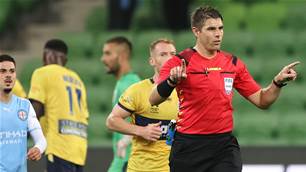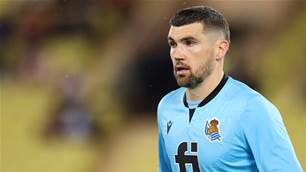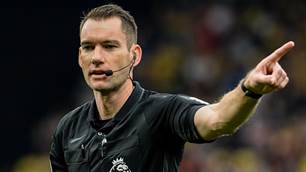If UEFA want their experiment with goalline referees' assistants to succeed and be adopted into the fabric of the game European football's governing body must be hoping for controversial incidents by the dozen.
Although the idea, in principle, is an admirable one the practicalities of it may need ironing out.
Although debatable penalties and goals not being given despite the ball crossing the line always grab the headlines the truth is there is not a proliferation of stand-out cases in the majority of matches.
And if Everton's victory over AEK Athens is anything to go by, UEFA might have to consider adding deckchairs and flasks of coffee to the electronic communication gadgetry now issued as standard.
No-one got to hear what additional assistant referees (for that is what they are called) Hubert Siejewicz and Pawel Gil thought of their 'debut' in the new role.
However, you can guarantee the Poles were happier to be on Merseyside on a mild September evening rather than standing motionless in rapidly-dropping temperatures in Belarus in November.
When that happens you may find more of these officials championing the use of television cameras - which tend not to feel the cold quite as much.
Apparently the officials have been given dispensation to wear gloves and tracksuit bottoms when it gets cold but hats are definitely out.
No doubt the fans whose views were occasionally partially obstructed by the new additions will also have something to say on the initiative.
Everton's first goal required no intervention from the new additions as Joseph Yobo's header thundered into the back of the net.
No decision was needed either for the second from Sylvain Distin despite it being something of a scrambled effort inside the six-yard box.
The official alongside the goalline for Steven Pienaar's 25-yard rocket into the bottom corner must have been tempted to applaud just to give himself something to do - especially as he knew in the second half he was likely to be nothing more than a spectator.
Typically, when the controversial incident arose 10 minutes after half-time it was close to the touchline and referee Robert Malek needed little assistance to send off Carlos Araujo.
With the second, Saha's sending-off, Malek was again ideally placed to issue the red card.
If the experiment is successful this season it will be introduced in the Champions League next term and then the top division only in each country that falls under UEFA's jurisdiction the year after.
The definition of success, however, may exercise one of UEFA's numerous committees for many a long hour.
Although debatable penalties and goals not being given despite the ball crossing the line always grab the headlines the truth is there is not a proliferation of stand-out cases in the majority of matches.
And if Everton's victory over AEK Athens is anything to go by, UEFA might have to consider adding deckchairs and flasks of coffee to the electronic communication gadgetry now issued as standard.
No-one got to hear what additional assistant referees (for that is what they are called) Hubert Siejewicz and Pawel Gil thought of their 'debut' in the new role.
However, you can guarantee the Poles were happier to be on Merseyside on a mild September evening rather than standing motionless in rapidly-dropping temperatures in Belarus in November.
When that happens you may find more of these officials championing the use of television cameras - which tend not to feel the cold quite as much.
Apparently the officials have been given dispensation to wear gloves and tracksuit bottoms when it gets cold but hats are definitely out.
No doubt the fans whose views were occasionally partially obstructed by the new additions will also have something to say on the initiative.
Everton's first goal required no intervention from the new additions as Joseph Yobo's header thundered into the back of the net.
No decision was needed either for the second from Sylvain Distin despite it being something of a scrambled effort inside the six-yard box.
The official alongside the goalline for Steven Pienaar's 25-yard rocket into the bottom corner must have been tempted to applaud just to give himself something to do - especially as he knew in the second half he was likely to be nothing more than a spectator.
Typically, when the controversial incident arose 10 minutes after half-time it was close to the touchline and referee Robert Malek needed little assistance to send off Carlos Araujo.
With the second, Saha's sending-off, Malek was again ideally placed to issue the red card.
If the experiment is successful this season it will be introduced in the Champions League next term and then the top division only in each country that falls under UEFA's jurisdiction the year after.
The definition of success, however, may exercise one of UEFA's numerous committees for many a long hour.
Copyright (c) Press Association
Related Articles

Four Australians to referee at 2022 FIFA World Cup

Socceroos Abroad: European Play-off Round Draw Results













